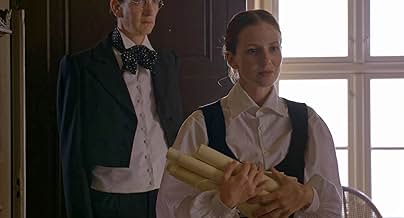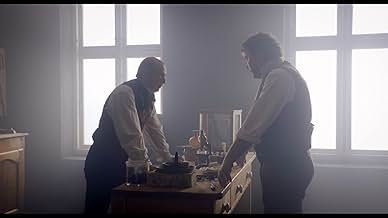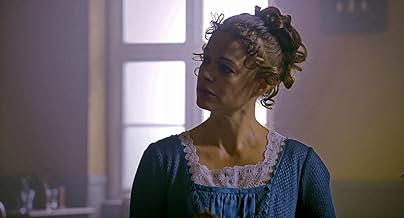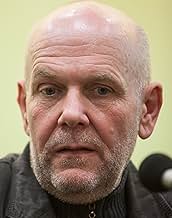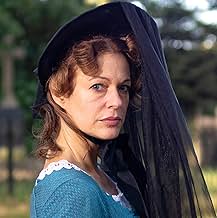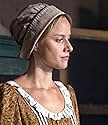IMDb-BEWERTUNG
7,2/10
3939
IHRE BEWERTUNG
1828: Zwei sehr unterschiedliche Frauen treffen in einem Zeitalter aufeinander, das für beide keinen Platz hat.1828: Zwei sehr unterschiedliche Frauen treffen in einem Zeitalter aufeinander, das für beide keinen Platz hat.1828: Zwei sehr unterschiedliche Frauen treffen in einem Zeitalter aufeinander, das für beide keinen Platz hat.
- Regie
- Drehbuch
- Hauptbesetzung
- Auszeichnungen
- 29 Gewinne & 22 Nominierungen insgesamt
Empfohlene Bewertungen
I liked it because is is a psychological thriller. My husband liked it because of the detailed historical accuracy in costumes and set! It gives you a lot to talk about, with several compelling subthemes (progress, women's rights, psychology, crime investigation). It is also a beautifully filmed movie, with a strangely quiet feel and gorgeous scenery. The tension is on many levels.
Deftly filmed by director Udo Flohr, "Effigy - Poison and the City" offers an absorbing glimpse of history that should satisfy period drama fans. Set in the 19th-century German port city of Bremen, the film is based on the true story of Gesche Gottfried. As one of the first female serial killers ever identified, she was beheaded in 1831 - Bremen's last public execution.
The movie skilfully blends elements of suspense, drama, and psychological thriller, keeping the audience engaged and intrigued throughout. Its meticulous attention to historical detail immerses viewers in the era's atmosphere. The pacing is deliberate - and occasionally slow, but this apparent mundanity underscores the grim brutality of its subject matter.
Lead actress Suzan Anbeh, who portrays Gesche Gottfried, delivers a nuanced and compelling performance, expertly balancing the character's complexity and evoking both empathy and revulsion. She presents Gottfried not just as a villain but as a multifaceted individual shaped by her circumstances and demons. Consequently, the film also delves into themes of gender and societal roles, reflecting on how women were perceived and treated during that time. It offers both entertainment and insight.
Overall, if you're a fan of thought-provoking psychological thrillers and period pieces alike, give Effigy a watch.
The movie skilfully blends elements of suspense, drama, and psychological thriller, keeping the audience engaged and intrigued throughout. Its meticulous attention to historical detail immerses viewers in the era's atmosphere. The pacing is deliberate - and occasionally slow, but this apparent mundanity underscores the grim brutality of its subject matter.
Lead actress Suzan Anbeh, who portrays Gesche Gottfried, delivers a nuanced and compelling performance, expertly balancing the character's complexity and evoking both empathy and revulsion. She presents Gottfried not just as a villain but as a multifaceted individual shaped by her circumstances and demons. Consequently, the film also delves into themes of gender and societal roles, reflecting on how women were perceived and treated during that time. It offers both entertainment and insight.
Overall, if you're a fan of thought-provoking psychological thrillers and period pieces alike, give Effigy a watch.
10gareth33
The film's foundation in a true story significantly and it really impacted my admiration for it. Kudos for adeptly and artistically presenting the narrative with a robust feminist perspective. The custom-composed film score, executed by a 40-piece orchestra, is masterfully crafted and seamlessly aligns with the overall film ambiance. While not adhering to a modest budget, this isn't your typical Hollywood production, demanding your focused engagement. However, the investment is undeniably rewarding, even for those who aren't typically drawn to historical dialogues. Encountering films like this isn't a frequent occurrence, so I'm genuinely pleased to have come across it. I'll definitely make a point to recommend it to my family and friends.
In this true story, two formidable women deliver impactful performances at the forefront. The narrative, if fabricated, would seem implausively exaggerated. It's unsettling to realize that the seemingly benign yet cunning woman who poisoned about 15 people over years in Bremen actually existed. I viewed this film in a German city close to Bremen, where locals are familiar with this historical incident.
In the movie, the murderess is depicted as jealous of the talents and status of her adversary, the young legal assistant Cato Böhmer. While there are some plausible theories about the murderer's motives and mindset, her actions largely remain an enigma, leaving viewers with lingering questions. What drove her to commit numerous murders while maintaining a facade of benevolence?
The film's dialogue stands out for its clarity, a refreshing change from modern movies that often feature mumbled lines or overpowering background sounds.
The score, created by a 40-member orchestra, beautifully enhances the film's mood.
The plot weaves in the technological and economic progress of the 1830s, educating viewers on railway development in Northern Germany against a backdrop of historical scenery. An intriguing aspect is the depiction of an early mechanical copier, a device I was unfamiliar with.
This movie is a must-see, transcending appeal beyond historical dialogue enthusiasts. I eagerly anticipate Udo Flohr's next creation and hope he continues to cast such compelling actors.
In the movie, the murderess is depicted as jealous of the talents and status of her adversary, the young legal assistant Cato Böhmer. While there are some plausible theories about the murderer's motives and mindset, her actions largely remain an enigma, leaving viewers with lingering questions. What drove her to commit numerous murders while maintaining a facade of benevolence?
The film's dialogue stands out for its clarity, a refreshing change from modern movies that often feature mumbled lines or overpowering background sounds.
The score, created by a 40-member orchestra, beautifully enhances the film's mood.
The plot weaves in the technological and economic progress of the 1830s, educating viewers on railway development in Northern Germany against a backdrop of historical scenery. An intriguing aspect is the depiction of an early mechanical copier, a device I was unfamiliar with.
This movie is a must-see, transcending appeal beyond historical dialogue enthusiasts. I eagerly anticipate Udo Flohr's next creation and hope he continues to cast such compelling actors.
In this gripping real-life narrative, two formidable women deliver compelling performances at the forefront.
The tale's authenticity lends credence to its chilling plot: in Bremen, a seemingly meek yet cunning woman, responsible for poisoning about 15 individuals over several years, truly existed. I viewed this film in a German cinema near Bremen, where locals are familiar with this historical incident.
The movie portrays the murderer as jealous of her adversary, Cato Böhmer, a young law clerk, reflecting on her motivations and psychological state, yet her actions largely remain enigmatic, leaving the audience with lingering questions. Why did she commit multiple murders while maintaining a facade of compassion?
The film stands out for its clear, enjoyable dialogue, a refreshing change from many modern movies that often use mumbled lines or drown conversations with loud music or background noise.
The original score, masterfully executed by a 40-member orchestra, beautifully complements the film's mood.
Set around 1830, the plot intertwines with the technological and economic progress of the time, including railroad construction in Northern Germany and historical settings. An intriguing aspect is the depiction of a mechanical copying device, unfamiliar to me.
This film is a must-watch, not just for enthusiasts of historical narratives. I eagerly anticipate Udo Flohr's next creation and hope for the continued casting of such dynamic performers.
The tale's authenticity lends credence to its chilling plot: in Bremen, a seemingly meek yet cunning woman, responsible for poisoning about 15 individuals over several years, truly existed. I viewed this film in a German cinema near Bremen, where locals are familiar with this historical incident.
The movie portrays the murderer as jealous of her adversary, Cato Böhmer, a young law clerk, reflecting on her motivations and psychological state, yet her actions largely remain enigmatic, leaving the audience with lingering questions. Why did she commit multiple murders while maintaining a facade of compassion?
The film stands out for its clear, enjoyable dialogue, a refreshing change from many modern movies that often use mumbled lines or drown conversations with loud music or background noise.
The original score, masterfully executed by a 40-member orchestra, beautifully complements the film's mood.
Set around 1830, the plot intertwines with the technological and economic progress of the time, including railroad construction in Northern Germany and historical settings. An intriguing aspect is the depiction of a mechanical copying device, unfamiliar to me.
This film is a must-watch, not just for enthusiasts of historical narratives. I eagerly anticipate Udo Flohr's next creation and hope for the continued casting of such dynamic performers.
Top-Auswahl
Melde dich zum Bewerten an und greife auf die Watchlist für personalisierte Empfehlungen zu.
- How long is Effigy: Poison and the City?Powered by Alexa
Details
- Erscheinungsdatum
- Herkunftsländer
- Offizielle Standorte
- Sprachen
- Auch bekannt als
- Effigy: Poison and the City
- Drehorte
- Mecklenburg, Deutschland(location)
- Produktionsfirma
- Weitere beteiligte Unternehmen bei IMDbPro anzeigen
Box Office
- Budget
- 485.000 $ (geschätzt)
- Laufzeit
- 1 Std. 25 Min.(85 min)
- Farbe
- Sound-Mix
- Seitenverhältnis
- 1.85 : 1
Zu dieser Seite beitragen
Bearbeitung vorschlagen oder fehlenden Inhalt hinzufügen





